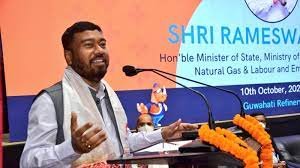In a recent interaction with reporters in Khargone, Union Minister of State for Petroleum and Natural Gas, Rameswar Teli, took a swipe at the opposition Congress party in Madhya Pradesh over its electoral promise of providing LPG cylinders at an implausibly low price of ₹500 each. The minister dismissed the claim, stating that even a “paper cylinder” could not be made available at such an unrealistic price.
Teli’s criticism comes in the wake of the Congress party’s pre-election pledge to make LPG cylinders affordable for every household in Madhya Pradesh. While the promise was intended to garner support from voters, the Union Minister highlighted the impracticality of the proposition. As the Minister of State for Petroleum and Natural Gas, Teli possesses expertise in the energy sector, making his statement significant.
LPG (liquefied petroleum gas) is a widely used cooking fuel in India, and the cost of LPG cylinders is subject to various factors such as global oil prices, taxes, subsidies, and transportation expenses. Currently, the price of an LPG cylinder in India is determined based on market dynamics and is heavily subsidized by the government to ensure affordability for consumers. Any significant reduction in the selling price would necessitate a substantial increase in subsidies or a decrease in taxes, both of which have economic implications.
Teli’s comment about a “paper cylinder” refers to the sheer impossibility of providing a physical product at such an artificially low price. The manufacturing, packaging, and transportation costs alone make it unfeasible to produce LPG cylinders at ₹500 each. The minister’s remark aimed to emphasize the need for realistic promises from political parties to maintain credibility with the public.
The electoral season often sees politicians making ambitious and sometimes unachievable promises to win voter support. However, it is crucial for citizens to critically evaluate such claims and consider their feasibility. The Union Minister’s dig at the Congress party serves as a reminder to voters about the importance of realistic and responsible governance.
The availability and affordability of LPG cylinders are crucial factors in ensuring clean cooking fuel for households across India. The central government has implemented schemes such as the Pradhan Mantri Ujjwala Yojana (PMUY), which aims to provide free LPG connections to economically disadvantaged households. Through this initiative, the government has successfully increased LPG penetration in rural areas, benefiting millions of families.
While it is important to address the issue of LPG affordability, the path to achieving it requires a comprehensive and sustainable approach. Factors such as promoting renewable energy sources, improving distribution networks, and implementing targeted subsidy mechanisms should be considered. Unrealistic promises that overlook these complexities can undermine the credibility of political parties and hamper the progress of welfare schemes.
As the election season unfolds in Madhya Pradesh and other parts of the country, it is essential for politicians to demonstrate prudence in their promises. Responsible governance entails presenting achievable plans that consider the economic realities and long-term sustainability of initiatives. By holding political parties accountable for their claims, citizens can contribute to fostering a more informed and responsible political culture.
Union Minister Rameswar Teli’s criticism of the Congress party’s promise to provide LPG cylinders at ₹500 each highlights the importance of realistic and responsible governance. The minister’s remark draws attention to the infeasibility of such a proposition and emphasizes the need for credible electoral promises. It is imperative for citizens to evaluate political claims critically and support initiatives that address complex issues like LPG affordability through comprehensive and sustainable approaches.


